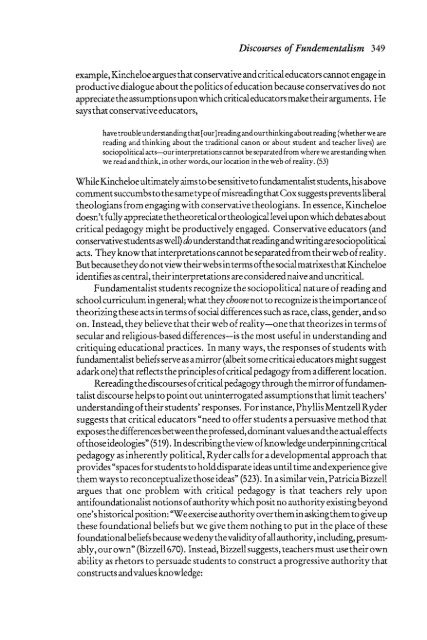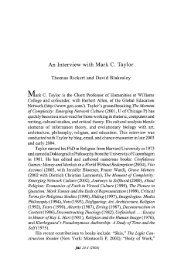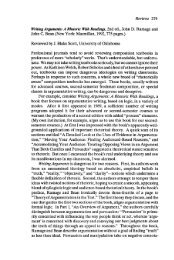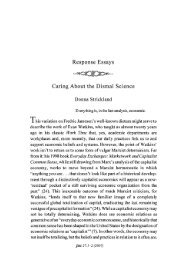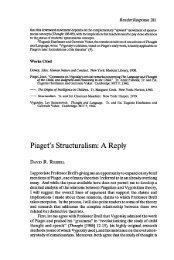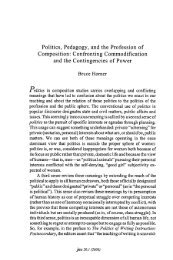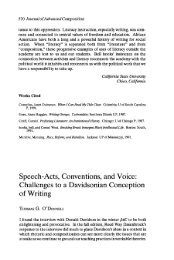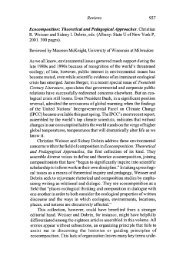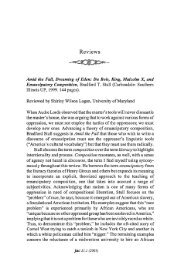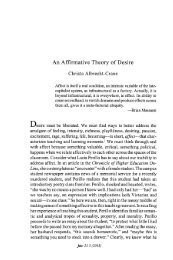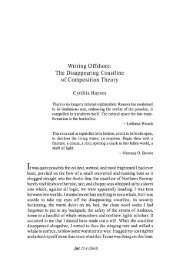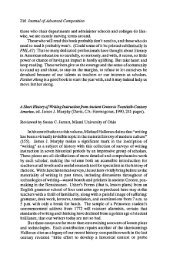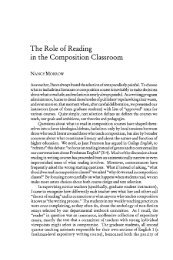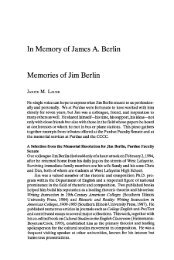It's aQuestion ofFaith: Discourses of Fundamentalism ... - JAC Online
It's aQuestion ofFaith: Discourses of Fundamentalism ... - JAC Online
It's aQuestion ofFaith: Discourses of Fundamentalism ... - JAC Online
Create successful ePaper yourself
Turn your PDF publications into a flip-book with our unique Google optimized e-Paper software.
<strong>Discourses</strong><strong>of</strong> Fundementalism 349<br />
example,Kincheloearguesthat conservativeandcriticaleducatorscannot engagein<br />
productive dialogueabout the politics <strong>of</strong> education becauseconservativesdo not<br />
appreciatethe assumptionsupon whichcriticaleducatorsmaketheir arguments.He<br />
saysthat conservativeeducators,<br />
have trouble understanding that (our] reading and our thinking about reading (whether we are<br />
reading and thinking about the traditional canon or about student and teacher lives) are<br />
sociopolitical acts-our interpretations cannot be separated from where we are standing when<br />
we read and think, in other words, our location in the web <strong>of</strong> reality. (53)<br />
WhileKincheloeultimatelyaimsto hesensitiveto fundamentaliststudents,hisabove<br />
comment succumbsto thesametype <strong>of</strong>misreadingthat Coxsuggestspreventsliberal<br />
theologians from engagingwith conservativetheologians. In essence,Kincheloe<br />
doesn't fullyappreciatethetheoreticalortheologicallevelupon whichdebatesabout<br />
critical pedagogy might be productively engaged. Conservative educators (and<br />
conservativestudentsaswell)dounderstandthatreadingandwritingaresociopolitical<br />
acts. They know that interpretations cannot beseparatedfrom their web<strong>of</strong>reality.<br />
Butbecausethey donotviewtheirwebsinterms<strong>of</strong>thesocialmatrixesthat Kincheloe<br />
identifiesascentral,their interpretations areconsiderednaiveanduncritical.<br />
Fundamentalist students recognize the sociopolitical nature <strong>of</strong> reading and<br />
schoolcurriculum ingeneral;what they choosenot to recognizeisthe importance <strong>of</strong><br />
theorizing theseactsinterms <strong>of</strong>socialdifferencessuchasrace,class,gender,and so<br />
on. Instead, they believethat their web <strong>of</strong> reality-one that theorizes in terms <strong>of</strong><br />
secular and religious-baseddifferences-is the most useful in understanding and<br />
critiquing educational practices. In many ways, the responses <strong>of</strong> students with<br />
fundamentalistbeliefsserveasamirror (albeitsomecriticaleducatorsmight suggest<br />
adark one)that reflectsthe principles<strong>of</strong>criticalpedagogyfrom adifferentlocation.<br />
Rereadingthe discourses<strong>of</strong>criticalpedagogythrough the mirror <strong>of</strong>fundamentalist<br />
discoursehelpsto point out uninterrogated assumptionsthat limit teachers'<br />
understanding <strong>of</strong>their students' responses. For instance,Phyllis Mentzell Ryder<br />
suggeststhat critical educators "need to <strong>of</strong>fer students a persuasive method that<br />
exposesthe differencesbetweenthe pr<strong>of</strong>essed,dominant valuesandthe actualeffects<br />
<strong>of</strong>thoseideologies"(519).In describingtheview<strong>of</strong>knowledgeunderpinning critical<br />
pedagogy asinherently political, Ryder callsfor a developmental approach that<br />
provides"spacesfor studentsto hold disparateideasuntil time andexperiencegive<br />
them waysto reconceptualizethose ideas"(523).In asimilarvein,Patricia Bizzell<br />
argues that one problem with critical pedagogy is that teachers rely upon<br />
antifoundationalist notions <strong>of</strong>authority which posit no authority existingbeyond<br />
one'shistoricalposition:"Weexerciseauthority overthem inaskingthem to giveup<br />
these foundational beliefsbut we givethem nothing to put in the place<strong>of</strong> these<br />
foundationalbeliefsbecausewedenythevalidity<strong>of</strong>allauthority, including,presumably,<br />
our own" (Bizzell670). Instead,Bizzellsuggests,teachersmust usetheir own<br />
ability as rhetors to persuade students to construct a progressive authority that<br />
constructsandvaluesknowledge:


